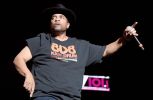by China N. Okasi
Even if you haven’t caught up on TV One shows, or spent hours cruising HelloBeautiful.com, chances are you’ve experienced Tom Joyner’s flagship radio show, or flipped through the pages of GIANT magazine—all because of one powerful businesswoman, Cathy Hughes. Hughes’ Radio One conglomerate comprises print, online, television and radio properties that would impress any aspiring entrepreneur. After all, the self-made mogul came from meager ends.
At 32, she bought a puny AM radio station, WOL, using a loan she received after begging 32 banks (the 33rd lender finally gave in). She then grew her little radio station into Radio One, a communications powerhouse that now controls 53 radio stations (including controlling stake in the Tom Joyner Morning Show) reaching between 18 and 20 million listeners per week. Today, Radio One is one of only three publicly-traded companies in the United States that is owned by an African-American.
Yet, as powerful as Hughes and Radio One appear, they, like any marriage, have faced their share of criticism and struggle. For example, TheRoot.com writer, Natalie Hopkinson, harshly denounced Cathy Hughes as leading a “one-woman boycott” against the ‘Performance Rights Act,’ not because Hughes cared ‘oh-so-much’ about her black listeners, according to Hopkinson, but because the bill would require all radio stations, including Hughes’, to pay royalties to musicians—and Hughes didn’t like that idea. In other words, Hughes had selfish motives, according to Hopkinson. To add insult to injury, when Hughes considered a reverse stock split move in the interest of her company a few months ago, analysts tore into her decision, and The Washington Post described the company’s financial finagling as “puzzling.”
With all the banter centered around the Maryland-headquartered Radio One, The Atlanta Post decided to speak to Hughes herself to tell her side of the story. In her own words, she offered the following.
Hughes on why black radio plays an important role:
“We average between 18 and 20 million listeners a week. Black radio is as critical a communications vehicle now as it has ever been. Katrina hit. Haiti, the earthquake, hit. My phones were so jammed that you couldn’t get a call through. Black radio was there [when all those crises in our community happened]. People may have had CNN on, but the TV volumes were turned down, so they could listen to black radio stations. [Black radio] provides the same type of social relationship with its listening audience that the black church does, only without the religious aspect.”
Hughes on how she started in the radio business:
“I’ve always wanted to be in radio. I created the “quiet storm,” which went on to become the number one format in the history of radio. At one time, there were 489 radio stations airing my radio format—which is why I left Howard University, because I tried to get them to license [quiet storm] and they wouldn’t, so they literally blew billions of dollars because they didn’t license it. Even white stations were doing a form of the quiet storm.
My first acquisition [as a radio businessperson] was a radio station called WOL in Washington D.C. It’s our flagship station, and it had a price tag of $1 million…I had one little obstacle to overcome before I could buy it, and that was that I was about $999,000 dollars short. So, I put together a business plan and pitched 32 banks, all of whom said no. But, my 33rd lender was a woman from Chemical Bank of NY, first week on the job and she said yes!”









